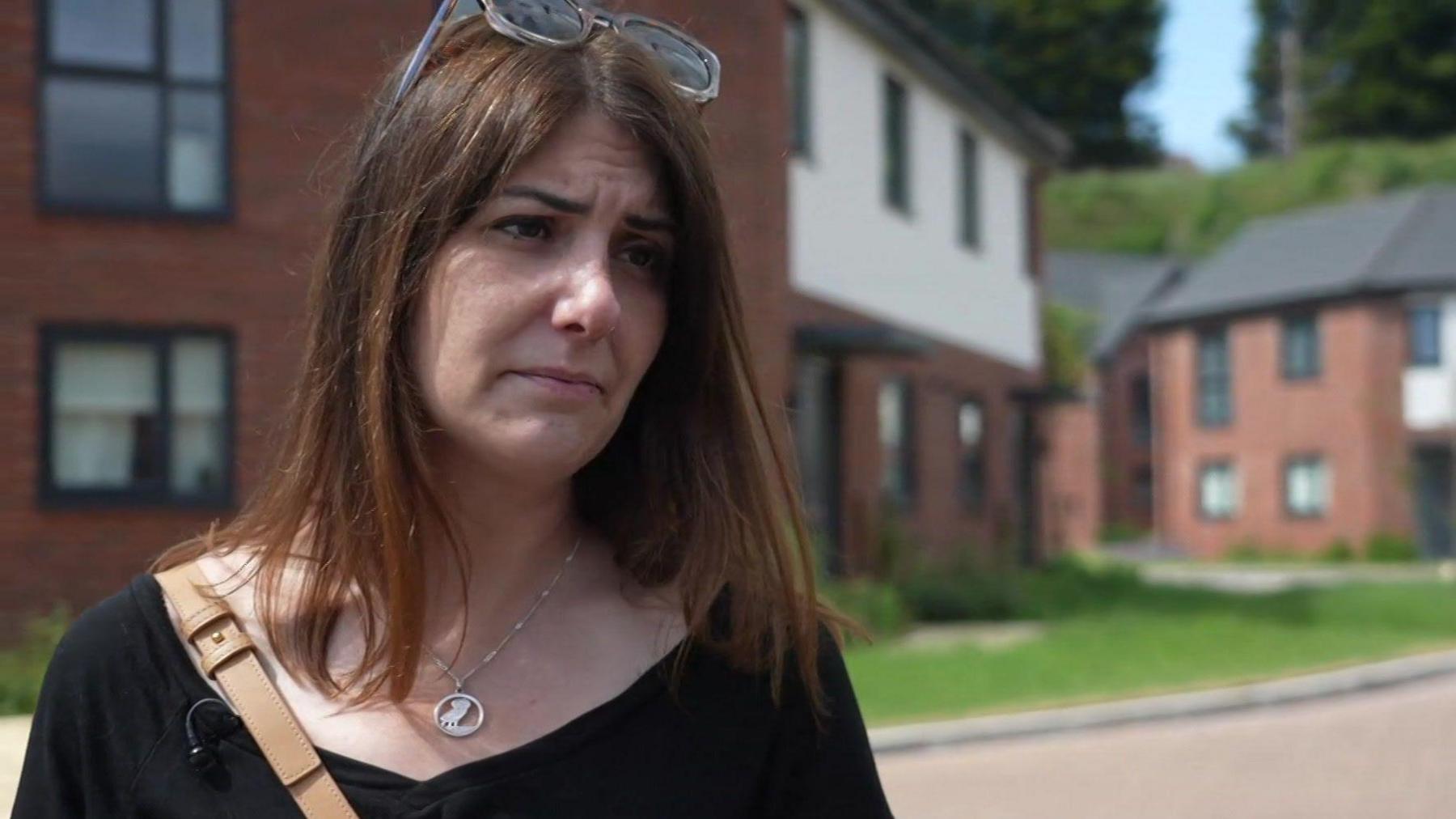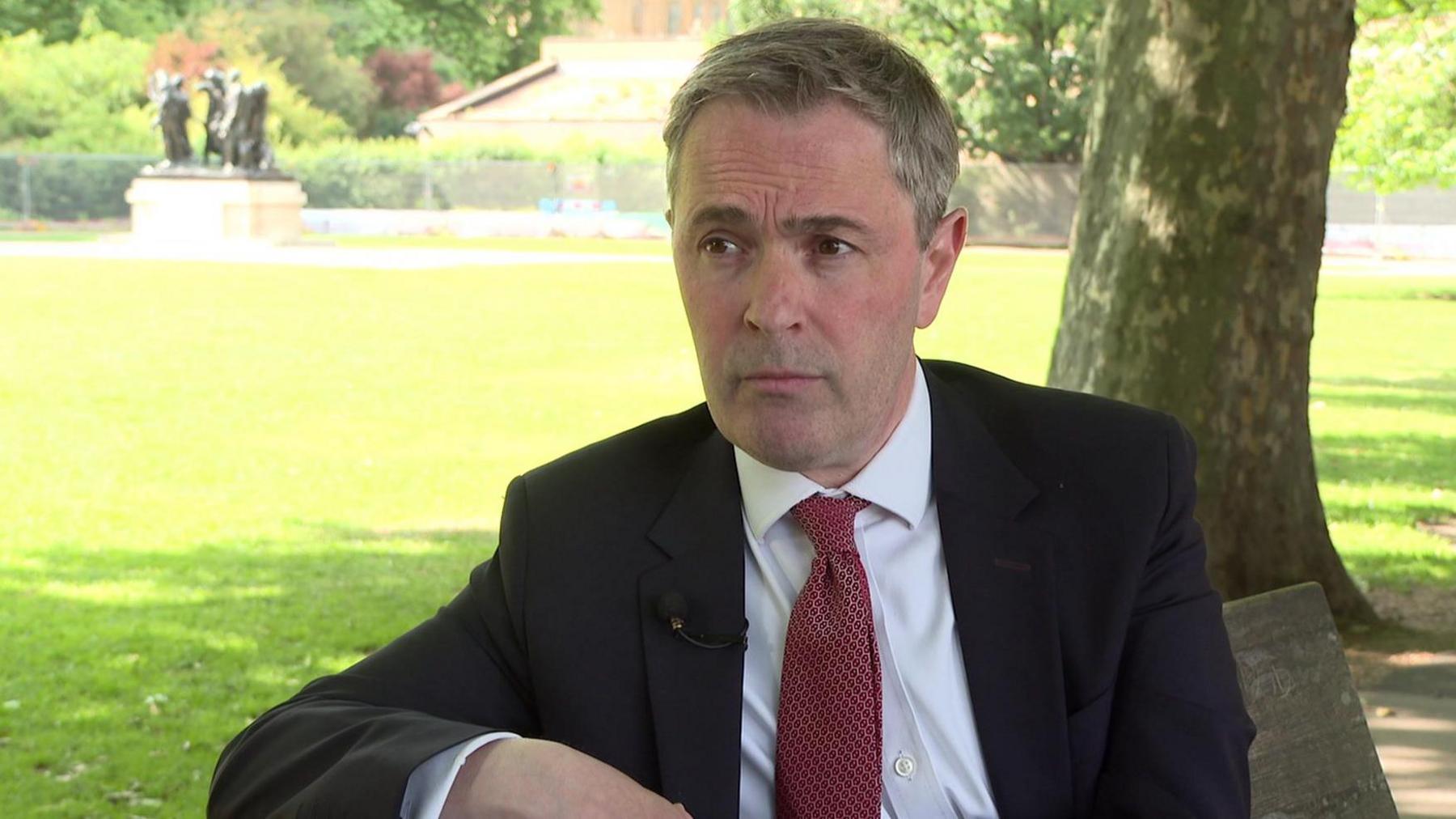MP once on benefits calls cuts 'brutal' - but colleague says 'moral' case for reform

- Published
Britain's welfare system is broken. Just about every Labour MP – maybe every member of Parliament - agrees with this.
But fixing the system is proving to be a problem.
The most divisive decision taken so far by Work and Pensions Secretary Liz Kendall is to restrict disabled people's eligibility for personal independence payments (Pip).
Legislation to enact the cuts – part of a package aimed at saving £5bn by 2030 – will be introduced in Parliament on Wednesday.
But a major rebellion is brewing on the Labour benches – and some of the party's new intake of MPs are among those considering voting against the bill.
This is a big step for a new MP but feelings are running high. Some told us they fear the benefit cuts will lead to more deaths.
At the same time, there are some freshly-elected Labour MPs who feel strongly that the party needs to use its huge Commons majority to bring in long overdue reforms to the system.
Benefits reform must be pushed through, says PM
- Published16 June
At-a-glance: Key changes to benefits in welfare shake-up
- Published18 March
Benefits crackdown unveiled with aim to save £5bn a year by 2030
- Published18 March
We spoke to two MPs elected for the first time last year, and who find themselves on different sides of the divide.
Cat Eccles has recent first hand experience of the benefit system.
Before becoming MP for Stourbridge, in the West Midlands, she found herself dependent on benefits when she was on long-term sick leave from her NHS job.
She was eventually let go and spent a year on welfare.
"If I hadn't have had family and friends to support me, I wouldn't have been able to eat," she says.
"I wouldn't have been able to pay my bills or even remain in the property that I was then, because it's private rented property."
Her experience has given her an insight that some of her MP colleagues do not share, she believes.
"There are people who that has never touched their lives and so it is perhaps a little bit more difficult for them to appreciate the challenges."
She is in favour of measures to get people with physical or mental health conditions into work - but she believes some ministers are using rose-tinted spectacles when assessing the willingness of employers to help.
And she says it has been wrong for the government to confuse measures to get people in to work with cuts to Pip, which she says currently help some of her constituents stay in work.
'Unimpressed'
The changes in Kendall's bill may have the opposite effect to what is intended, she argues.
"A number of constituents are in employment thanks to their Pip. They could be spending those payments on a carer to support them getting ready in the morning, or even topping up their salary, so they can work fewer hours and not get so exhausted.
"My question to ministers is: will they potentially lose that payment and therefore no longer be able to maintain their employment?"
Although no-one will lose their Pip payments until 2027, she says the "response of my constituents is one of fear".
Kendall has now offered something of an olive branch to potential rebels by telling them anyone who loses eligibility for Pip will keep their payments for a three month transition period.
Eccles has declared herself "unimpressed" and suggested that "this won't be enough to appease MPs".
Along with around 100 of her colleagues, she wants to see the increased threshold in the legislation for claiming Pip lowered to its current level.
Otherwise, she says, "people who can't cut up their own food, or someone who can't wash themselves" could lose out. "It's a brutal system," she adds.
Eccles hopes that if political arguments haven't persuaded some of her colleagues to come round to her point of view, then arithmetic might.
She has around a 3,000 majority in her Stourbridge seat but points out that more than 6,000 constituents receive Pip.
'Moral duty'
David Pinto-Duschinsky does not subscribe to that argument. He won his Hendon seat in north-west London by just 15 votes.
He believes it would be a political error for Labour to avoid radical reforms – or the whole system could become unsustainable.
He worked for the previous Labour government as an adviser in the Treasury under the late Alistair Darling but has been trying to grapple with the problems of unemployment and welfare for even longer.
He said: "I started working on this issue over 25 years ago at the then New Labour's government's New Deal Task Force, dealing with issues such as welfare to work and getting the long term unemployed into not just jobs but good long term sustained jobs."
A quarter of a century on, he believes the whole system is in danger.
"We have a moral duty to reform welfare and to safeguard the long-term future of that system. One in 10 working age adults is out of work in our country."
He insisted restrictions on Pip – the sticking point for many Labour MPs who otherwise accept reforms such as the "right to try" a job without losing benefits – were needed.
And as befits a former Treasury staffer, he comes armed with statistics.

While he insists the most vulnerable will be protected, he says: "The numbers of people claiming Pip are going up by more than 1,000 people a day and the cost of this has gone up by 50% since 2018 - that's just not sustainable."
He argues that "employment rates amongst disabled people are almost 30% lower than those without a disability".
"If we are serious about tackling low incomes and poverty amongst people with health conditions we have to tackle those issues," he adds.
He also denies that the government's reforms are fundamentally driven by the need to make savings.
"Of course there are economic considerations but the core reason for changing things is moral.
"This is an emotive and difficult issue but the current system is letting people down. There is nothing compassionate about a system that is throwing three million people on the scrapheap."
Parliament will vote on the welfare bill in a couple of weeks. With a large Labour majority ministers are confident of victory.
But clear blue – or perhaps red – water between the government and some of its own MPs seems unlikely to be bridged.

Sign up for our Politics Essential newsletter to read top political analysis, gain insight from across the UK and stay up to speed with the big moments. It'll be delivered straight to your inbox every weekday.